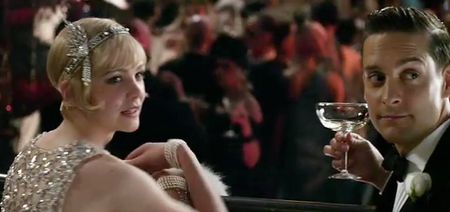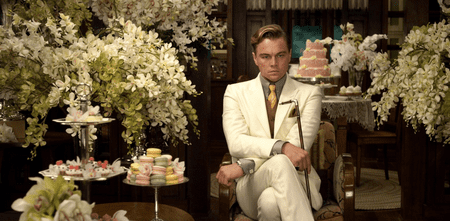
Leonardo DiCaprio welcomes you to the summer's most lavish party
"Gatsby. What Gatsby?"
Daisy asks with a rush of girlish 'it can't be!' alarm, her nerves far overpowering the tiny glimmer of hope you think you hear in her voice. Which is as sensible a reaction as anyone could have when hearing about the arrival of another Jay Gatsby in movie theaters. You don't mean THE GREAT GATSBY, do you?
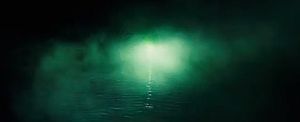 The F Scott Fitzgerald classic is a tough book to crack for filmmakers, its power so tied to its gorgeous (slim) prose, its subtle and cynical evocations and condemnations of American wealth and unspoken caste system. Further complicating adaptations is that the story is subjectively narrated. It's all told by Nick Carraway and his is, despite blood ties to the wealthy, an outsider's point of view. It's an easy book to love but a difficult one to adapt. But Hollywood keeps trying once every thirty years or so.
The F Scott Fitzgerald classic is a tough book to crack for filmmakers, its power so tied to its gorgeous (slim) prose, its subtle and cynical evocations and condemnations of American wealth and unspoken caste system. Further complicating adaptations is that the story is subjectively narrated. It's all told by Nick Carraway and his is, despite blood ties to the wealthy, an outsider's point of view. It's an easy book to love but a difficult one to adapt. But Hollywood keeps trying once every thirty years or so.
The story, if you are unfamiliar (though you won't want to admit that out loud) follows the attempts of the elusive mysterious extremely wealthy Jay Gatsby (Leonardo DiCaprio) to win back his lost love Daisy (Carey Mulligan) who he abandoned many years earlier while penniless to seek his fortune. That sounds like something out of a fairy tale, but to the novel's credit Fitzgerald doesn't exactly take it at face value as a hero's journey; what's so heroic about vast sums of money used only for personal gain?
Gatsby buys up an estate in West Egg Long Island where he has a direct eyeline across the water to a similarly palatial home in East Egg where Daisy lives with her rich and shady husband Tom Buchanan (Joel Edgerton) who is carrying on an affair with low class Myrtle (Isla Fisher) who lives above a gas station in "The Valley of Ashes" which director Baz Luhrmann stages like it's the 10th circle of hell. Gatsby throws decadent flashy parties hoping to lure Daisy in and seduces her cousin Nick (Tobey Maguire, our narrator) into helping him facilitate the reunion.
Which gets this party (aka movie) started AFTER THE JUMP…
If you've seen Baz Luhrmann's 'Red Curtains Trilogy' (Strictly Ballroom, Romeo + Juliet, and Moulin Rouge!) you'll immediately recognize this as a Bazmark production. All the elements are there: zooming cameras, extremely opulent production design and costuming (by Baz's other half, his wife Catherine Martin), hyper editing which frustratingly doesn't fully let you enjoy said opulent production design, anachronistic celebrated song scores, stylized performances from famous actors, and repetitive looping screenplay structure (by Baz's other other half, his writing partner Craig Pearce). That Baz is both the right choice to helm a modern The Great Gatsby and all wrong for it is evidenced in the chasm between the big set pieces and the rest of the movie.
The director's gift with stunning visuals sells Wealth as Intoxicating Fantasy superbly. The decadent party sequences with their contemporary music go a longer way in illustrating what was so roaring about "The Roaring 20s" better than most period pieces ever have. Baz has always had a flare for onscreen parties and understands how to drop you in among the revellers and leave you dizzy with excitement. Throughout the movie, Baz manages to make the parade of jaw-dropping wealth both funny — as in Gatsby's attempt to pretty up Nick's place with truckloads of flowers "do you think it's too much?" — and unnervingly dramatic, moments afterwards in that same scene and later in a key sequence when the five main characters drive into Manhattan for escape, pre air-conditioning. They remain trapped by wealth, holed up in a luxury hotel with servants chipping away at ice to cool them down. (Shouldn't they have just gone for a swim outside their front doors?)
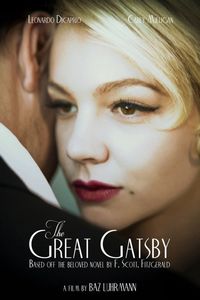 But Baz' approach only works in fits and starts because he hasn't adjusted it to the contours of the material. There are so many shots and flourishes pulled directly from Moulin Rouge! that The Great Gatsby starts to feel like a gratuitously odd remake of that hallucinatory musical. You half expect Kylie Minogue to pop up as the green fairy in an early drug fueled hotel party.
But Baz' approach only works in fits and starts because he hasn't adjusted it to the contours of the material. There are so many shots and flourishes pulled directly from Moulin Rouge! that The Great Gatsby starts to feel like a gratuitously odd remake of that hallucinatory musical. You half expect Kylie Minogue to pop up as the green fairy in an early drug fueled hotel party.
It's quite strange to see this (subconscious?) near-remake after Baz had professed that he was moving on from the Red Curtain Trilogy with Australia (2008), implying that his much celebrated (and detested) style was not so much his only way of expressing himself but merely a choice meant for those particular films. When Gatsby really needs to investigate the characters, or needs to breathe to make you feel it, it falls apart. Baz just can't stop tricking up the sequences with visual wonder and fireworks (sometimes literally). The driving sequences strike me as the most obnoxious in this regard, with much noise and 3D propulsiveness amounting to absolutely nothing.
One of Gatsby's last visuals is a silhouette of Jay Gatsby in the green light of Daisy's shoreline. It's an arresting emotional image but Baz cuts away from it before it can achieve anything like the final iconic significance it should be aiming for. Daisy's entrance, another example, is teased by billowing white curtains, and just keeps on teasing. We get that she's a vision to Nick, and this luxurious world is bracing new air for him but it starts to feel like parody. Stop billowing, curtains! We totally see you.
But Daisy is a problem for any filmmaker and actress.
Novels have a much easier time than actors do at selling characters that are more narrated fantasy and ideal than fully realized human beings. Carey Mulligan, a gifted if already over-cast actress, aims high (I love the high affected voice, too fast to feel narcotized but too flat to be get her out of Stepford) but Daisy is still Daisy, more projection than character and how do you embody that? Newcomer Elizabeth Debicki is great fun as intimidating sporty Jordan Baker but she isn't given much screentime.
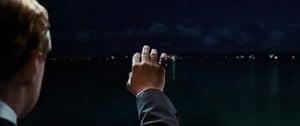 The male principals mostly end at capable with significant obstacles to greatness: Maguire is non-committal as Nick Carraway, never playing the choices the screenplay has made about the character from its odd framing device and Baz & Craig have entirely ignored Nick's (arguable) gayness in the book which is a strange missed-opportunity given the movie's love of modernization; Edgerton is as watchable as ever as the racist bullying Buchanan, but he reads less uppercrust than DiCaprio which makes for some weird friction with the themes and characters as written; DiCaprio, who looks fantastic as Gatsby and who was such a revelation as a young actor, seems to have calcified into an actor with a weirdly limited range of facial expressions – we've literally seen them all before with him. Not that his dialogue helps. His constant refrain of "Old sport!" which he says HUNDREDS OF TIMES would be tough for any actor to pull off but since Leo gives it virtually no shift in feeling or variety or subtext from scene to scene (Watch Streep's "That's All" symphony from Prada to understand how this is done) it's entirely grating and sure to be mocked in a YouTube super-cut the second this is available on Blu-Ray.
The male principals mostly end at capable with significant obstacles to greatness: Maguire is non-committal as Nick Carraway, never playing the choices the screenplay has made about the character from its odd framing device and Baz & Craig have entirely ignored Nick's (arguable) gayness in the book which is a strange missed-opportunity given the movie's love of modernization; Edgerton is as watchable as ever as the racist bullying Buchanan, but he reads less uppercrust than DiCaprio which makes for some weird friction with the themes and characters as written; DiCaprio, who looks fantastic as Gatsby and who was such a revelation as a young actor, seems to have calcified into an actor with a weirdly limited range of facial expressions – we've literally seen them all before with him. Not that his dialogue helps. His constant refrain of "Old sport!" which he says HUNDREDS OF TIMES would be tough for any actor to pull off but since Leo gives it virtually no shift in feeling or variety or subtext from scene to scene (Watch Streep's "That's All" symphony from Prada to understand how this is done) it's entirely grating and sure to be mocked in a YouTube super-cut the second this is available on Blu-Ray.
Though I've spilled hundreds of words detailing the problems with the new Gatsby, I would never trade Baz's Red Curtain Trilogy for the world. I just wish he'd let some of the epic Hollywood classicism he was aiming for in Australia (by most measures his least popular film) sink in to this new film to combat it's Moulin-Rougeyness. Like Gatsby and Carraway, Baz is too enamored by the wealthy leisure class to really see them for who they are. The fatal and most telling decision in this update is the reduction of the role of Myrtle (a game Isla Fisher) to tarty prop. She's nothing more than future roadkill in the scheme of things. In the end, Baz doesn't seem to care that the rich can get away with murder, but he most definitely cares about Gatsby's dreams of wrapping Daisy up in an ever greater cocoon of wealth.
The Great Gatsby has been filmed once as a noir of sorts (1949), once as a creaky prestige piece (1974) and arrives to us now as a kinetic "Spectacular! Spectacular!" by way of Baz Luhrmann. But F Scott Fitzgerald's great American novel remains, for the movies, an elusive dream as tragically unfulfilled and in this case as shallow as Jay Gatsby's.

"I've just heard the most shocking thing"…they're totally remaking this again in 30 years!
Nathaniel Rogers would live in the movie theater but for the poor internet reception. He blogs daily at the Film Experience. Follow him on Twitter @nathanielr.
